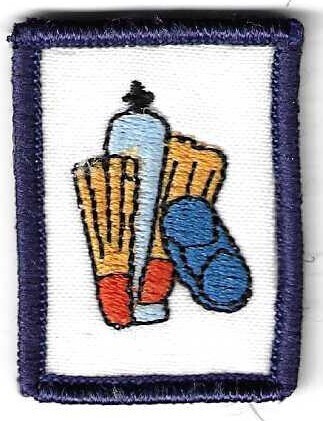Discover Scuba, Wisconsin Badgerland council own IP (Remake-- Creator unknown)
Requirements:
For Girl Scout Cadettes, Seniors, and Ambassadors
To earn this IPA girls must complete: 2 skill builders (skill builders 1 and 2 must be completed first,) 1 technology, 1 service project, 1 career and 2 additional activities taken from any section. Girls must work with a certified SCUBA instructor, and follow all Safety Activity Checkpoints related to SCUBA from GSUSA when earning this award. For suggestions of certified instructors, contact your local Girl Scout Council.
Skill Builders #1* & #2* are required before doing any other Skill Builder activity.
1. *Review Safety Activity Checkpoints requirements from GSUSA for SCUBA diving. Including those for swimming at a swimming pool where training will take place. Make sure the pool meets the requirements and all requirements for SCUBA are met and followed.
2. *Before meeting at the pool to do the swimming portion of this IPP, familiarize yourself with the SCUBA equipment. Know what the equipment is and how it is used.
3. Be able to do any three of the following:
• Locate and read the submersible pressure gauge while underwater
• Find the proper weight
• Perform the pre-dive safety check
• Clear a snorkel from water using the blast method and resume breathing without lifting your face from the water.
• Completely remove and replace and clear the mask of water while underwater.
• Remove weights at surface with minimal assistance using the weight system’s quick release mechanism.
4. Do any four of the following breathing exercises:
• Learn the proper skill to breath properly
• Inflate and deflate the BCD • Clear the regulator underwater
• Using the purge button method, breath normally and clear a partially flooded mask
• In shallow water, breathe underwater for at least 30 seconds using another air source provided by another diver
• Swim a distance of at least 50 meters/yards at the surface while wearing scuba gear and breathing through a snorkel. • Breathe underwater for not less than one minute while not wearing a mask
• Complete the following activities in shallow water:
• Swim underwater with scuba equipment while maintaining control of direction and depth.
• Properly equalize the ears and the mask to accumulate depth changes.
• Demonstrate the techniques for a proper ascent
5. Complete two of the following swimming activities in deep water:
• Demonstrate appropriate deep-water entries
• Demonstrate a descent using appropriate five-step method
• Remove the weights and scuba fins (if necessary) and exit using the most appropriate means
• Orally inflate a BCD to at least half way full and the fully deflate
6. Be able to do the following signals:
• Signal for adequate or low air based on the gauge’s caution zone
• Recognize and demonstrate standard hand signals
• React to air depletion by giving out-of-air signals
7. Find out how to clean and maintain SCUBA equipment.
Technology
1. Watch a several documentaries about oceanography, marine biology, ocean ecology or learning to dive. Make a list of the technologies used in the study of ocean life today including the uses, advantages and disadvantages. Present this information to your troop or family.
2. Using the internet research popular places to SCUBA dive. Research the various ocean ecosystems that exist. Find out what type of fish, plant life and coral you may encounter while diving in at least 4 different ocean environments. Create a collage, drawing, or painting of each environment you researched detailing what life you would expect to see while diving. Display these creations for others to see.
3. Visit a SCUBA shop to see the different equipment available to purchase. Arrange for a knowledgeable sales staff person to give you a tour of the available equipment for SCUBA divers. Create a comparison list including prices, brands and features of scuba equipment.
4. Research and compare SCUBA equipment today to the first scuba equipment made. Create a timeline of developments in underwater personal life support apparatuses.
Service Projects Service Projects
1. The world’s oceans are facing a wide variety of environment disasters. Research one of the many important issues surrounding our world’s oceans and create an informational presentation to share with your community. Be sure to include how individuals can help! Pick one of the topics below, or a topic of your choice.
a. Trash in the ocean
b. Chemical contamination of the ocean
c. Global climate change
d. Over fishing
2. Research environmental effects SCUBA diving has had on the environment and create a presentation for your community.
3. Participate in a service project cleaning up a beach or lake or other area where people SCUBA dive.
Career Exploration Career Exploration
1. Research possible careers in scuba diving. Find out what experience and certification is required for these careers.
2. Research and compare the requirements to become PADI or NAUI certified SCUBA divers, and instructors.
3. Invite a certified SCUBA instructor to talk to your group or troop about SCUBA diving. Find out what type of certification he/she holds and the different scuba dives he/she has participated.
4. Read about a well-known SCUBA diver. Find out how the SCUBA diving changed over the course of their career. Find out what his/her greatest career accomplishment and failure.
